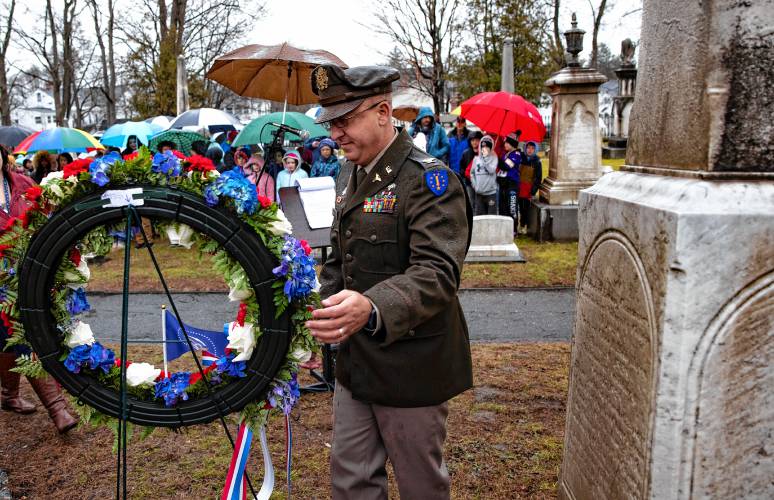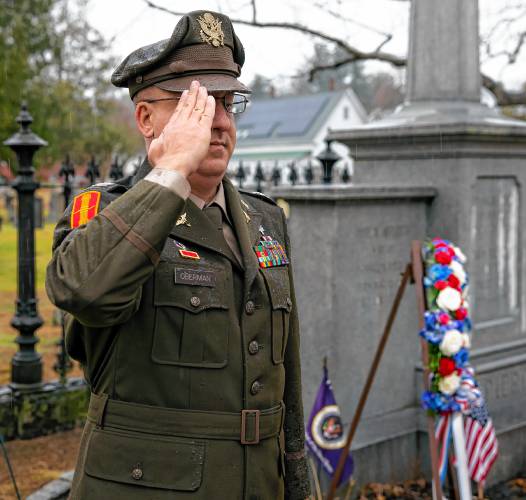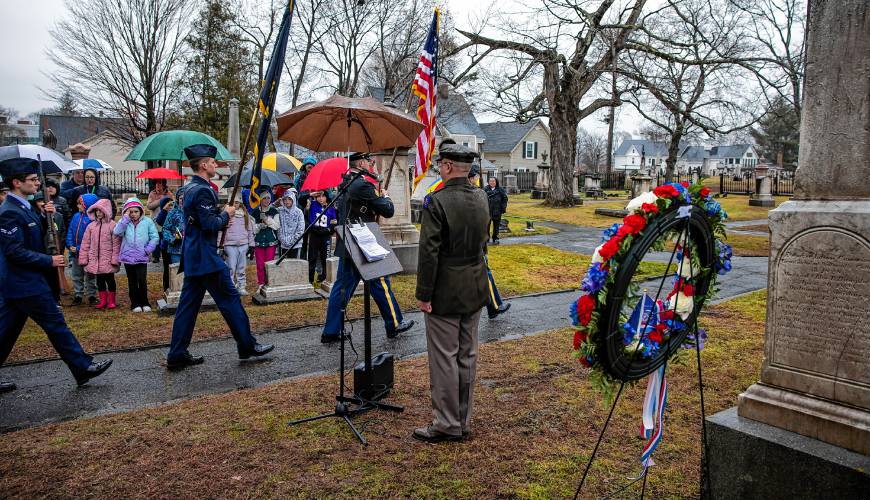Former President Franklin Pierce: ‘Not a perfect man, but he was a good man’
| Published: 11-26-2024 2:22 PM |
Celebrating what would have been his 220th birthday on Nov. 23, members of the Pierce Brigade, New Hampshire National Guard and Beaver Meadow students gathered to honor Franklin Pierce, the only Granite Stater to serve as U.S. President, at his grave in Old North Cemetery on Tuesday.
“Franklin Pierce was not a perfect man, but he was a good man who was dedicated, worked hard, and believed in serving his state and his country,” said Col. Richard Oberman, medical commander and deputy director of the Joint Staff at N.H. Army National Guard. “For that, he’s the kind of role model we should try and emulate every day, not just once a year. Happy Birthday, thank you, Frank.”
Beneath a shower of November sleet, a wreath sent by the White House each year in the president’s memory was laid at his headstone.
Born in a Hillsborough cabin, as Oberman noted, Pierce was the nation’s 14th president, elected in 1852 and serving one term in one of the fiercest periods of American history.
Pierce’s father Benjamin had been governor, and Franklin got his start in politics young: When sworn in at age 48, he had already been a state representative and speaker of the New Hampshire House of Representatives, and served in Washington as a congressman and later a senator from New Hampshire. He also served as a brigadier general in the Mexican-American War of the late 1840s.
Other than the time he spent in Washington, Pierce lived in Concord for much of his adult life. The home he and his family shared from 1842-1848, the Pierce Manse, was rescued from demolition at its original Montgomery Street location in 1971 and relocated to its current site overlooking Horseshoe Pond. The Pierce Brigade, volunteers who led the work, maintain it today as a historical site. Pierce’s later home on South Main Street, where he retired after his presidency and where he died, burned down in 1981.
Oberman highlighted Pierce’s character, describing him as caring, brave and even mischievous.
“He would be the kid in school who would stand up for you if you were being picked on, help you if your locker was stuck or if you were having trouble with your math homework,” he said. “Franklin would also be the classmate who would tell you a funny joke or pull a prank on someone.”
Article continues after...
Yesterday's Most Read Articles
 Concord may finally buy long-closed rail line with hopes of creating city-spanning trail
Concord may finally buy long-closed rail line with hopes of creating city-spanning trail
 Free speech group, residents back Bow parents’ free speech appeal in case involving transgender athletes
Free speech group, residents back Bow parents’ free speech appeal in case involving transgender athletes
 New Cheers owners honor restaurant’s original menu while building something fresh
New Cheers owners honor restaurant’s original menu while building something fresh
 ‘Perfect fit’: Fabulous Looks Boutique shifts leadership, preserving brands and styles
‘Perfect fit’: Fabulous Looks Boutique shifts leadership, preserving brands and styles
 Ayotte vetoes bathroom bill, defeating it for second time in two years
Ayotte vetoes bathroom bill, defeating it for second time in two years
He also, Oberman noted, “earned the nickname Handsome Frank because he looked so very young for his age.”
Pierce was considered affable and had a successful legal career outside politics, but his personal life was blanketed by tragedy. He and his wife, Jane, lost their three sons young, including 11-year-old Benjamin, who died in a train accident just months before his presidential inauguration. The Pierces entered the White House childless.
Amid rising tensions between pro- and anti-slavery powers, Pierce was a compromise candidate: He was a northerner who did not own slaves but was also a member of the Democratic Party — at that time it dominated Southern, pro-slavery states — who argued that the U.S. Constitution allowed slavery. Pierce won dominantly, and he embodied a belief at the time that peace and the status quo could be preserved through successive compromises and concessions.
He is known for endorsing the Kansas-Nebraska Act, which paved the way for slavery to expand into the West and led to a violent power struggle in the newly settled territories. He was also passionate about foreign policy and was an expansionist and a fiscal conservative.
Oberman alluded to this mixed legacy, but emphasized that Pierce was driven by a desire to serve all his life and “focused on what he thought was the best for the country and its people.”
Uniquely, Pierce spent almost all of his presidency without a deputy: Vice President William King died from tuberculosis just a month after taking office and was never replaced. Only two vice presidents served shorter terms — John Tyler and Andrew Johnson both became president after Presidents William Henry Harrison and Abraham Lincoln, respectively, died.
At a time when primaries were party affairs and not public elections, Pierce was denied renomination by the Democrats in 1856 in favor of Pennsylvanian James Buchanan. He eventually retired to Concord, continuing his political involvement and taking up farming. He died of cirrhosis in 1869, according to the White House Historical Association.
“Almost 220 years later, we stand by their gravestones to remember Franklin’s life and his legacy of serving others, especially people who are less fortunate,” Oberman said.
Catherine Mc Laughlin can be reached at cmclaughlin@cmonitor.com










 ‘A little piece of everything I like’: New Pittsfield barbershop brings more than a haircut to downtown
‘A little piece of everything I like’: New Pittsfield barbershop brings more than a haircut to downtown NH judge decides to pause Trump’s birthright citizenship order
NH judge decides to pause Trump’s birthright citizenship order Canterbury honors ‘real heroes’ with updated Military Veterans’ Project
Canterbury honors ‘real heroes’ with updated Military Veterans’ Project Look, up in the sky! It’s… an Airstream trailer?
Look, up in the sky! It’s… an Airstream trailer?
